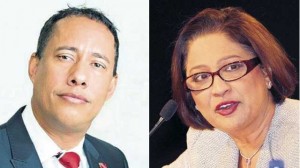 PORT OF SPAIN, Trinidad, CMC — The coalition People’s Partnership government is denying suggestions of racial and religious discrimination in the deportation of African nationals, saying that Port of Spain had deported more Guyanese than citizens of any other country.
PORT OF SPAIN, Trinidad, CMC — The coalition People’s Partnership government is denying suggestions of racial and religious discrimination in the deportation of African nationals, saying that Port of Spain had deported more Guyanese than citizens of any other country.
Attorney General Anand Ramlogan told the Senate that it was “mischievous, malicious and very dangerous” for allegations to be made that the Indo-dominated government was also engaged in racial profiling in the deportation of illegal immigrants.
He told legislators that statistics from 2010 to October 2014 indicated that “the number one country with deportees from Trinidad and Tobago is not the African continent, not India, but Guyana”.
“The truth of the matter is that illegal immigrants from the African continent were way down on the list at number seven. The total number of African immigrants that have been deported from 2010 to now is 70 persons. Seventy African deportees in four, nearly five, years, against 734 Guyanese,” he said. So when we run to light a fire, coming on the heels of the Ferguson experience in the US and we jump to pour kerosene to light a social flame that we cannot control, then we must look to the truth which shall set us free and the statistics show that we must reject outright that kind of nonsense and absurd allegation against the Government of Trinidad and Tobago.”
He said there is absolutely no merit, truth or justification but was mischievous, malicious and very dangerous in a society such as this.
Last weekend, the government defended its decision to spend TT$2.6 million (One TT dollar = US$0.16 cents) to charter a plane to deport 15 illegal Ghana nationals saying that it was difficult to get visas for them to travel back to their country through commercial flights.
The Ghanaians were deported following a marathon 12-hour court case on Saturday by lawyers to prevent their deportation.
National Security Minister Gary Griffith said that there were 100,000 illegal immigrants here, whom he said were draining the country’s resources. He also accused some of them of being involved in criminal activities.
“The matter has to be dealt with and we cannot bury our heads in the sand. What was done was done within the law,” said Griffith, adding that the deportees can re-apply to be regularised.
Meanwhile, Ramlogan denied that the government was engaged in a witch-hunt against immigrants.
The Attorney General told the Senate that he had been provided with figures from the Immigration Department that showed out of a total of 1,757 deportees between 2010 and now, 41.8 per cent of deportees (734) were from Guyana.
He said this was followed by Jamaica “with a big gap”, with 18.5 per cent or 325 deportees.
Other Caribbean countries — Dominican Republic, Cuba, Haiti, Dominica — were third, with 11.4 per cent of deportees; fourth was Asia — China, Indian and other Asian countries, with 10.2 per cent, followed by Central and South America (5.7 per cent) and the other Caribbean Community (Caricom) countries.
“We have a tendency in Trinidad to call upon the law enforcement officers to do their duty and enforce the law… and when they do… the very same people criticise and condemn them. The latest trend is if you arrest anybody — racial profiling, religious profiling. I don’t know what they expect the police to do. It is high time that we stop this hypocritical behaviour in Trinidad and Tobago and allow the law enforcement agencies to do their job as we were trained to do.”
Meanwhile, Prime Minister Kamla Persad Bissessar has defended the decision to deport illegal citizens, saying her administration would do everything possible to ensure the safety of nationals
She said national security minister was speaking on behalf of her administration when he said he was not deeming all illegal immigrants as national security threats, but there were some who posed a risk to the nation and that is why the ministry is intent on clamping down on the situation and offering status regularisation.
“I think the minister of national security has spoken on the matter, which is the position of the Government, that we will do all we can to ensure the safety and security of our citizens. From what I read in the article, it is supposed to be a stay for one year, so that one year has expired,” she said on Tuesday night with regards to a newspaper article that claimed Nigerian rebels who were involved in military attacks against the Nigerian government spent a year in this country as tourism students.
Last year, the head of Special Branch wrote to former national security minister Jack Warner, raising an alarm about the presence of 66 rebel Nigerians, advising they could cause havoc in this country.
Prime Minister Persad Bissessar said she was aware of the letter and the matter was being monitored constantly.
“I do recall a copy of that letter being brought to our attention. Minister Griffith was then our advisor with respect to NSC (National Security Council) matters. We did discuss it and we kept the police on board, intelligence sources and nothing really extraordinary happened then. But they were under constant monitoring then and we continue to do same,” she said.
